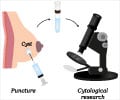A novel way of targeting breast cancer cells that are resistant to current treatments have been discovered by scientists at the University of Michigan Comprehensive Cancer Centre.
A novel way of targeting breast cancer cells that are resistant to current treatments have been discovered by scientists at the University of Michigan Comprehensive Cancer Centre.
They have identified a receptor called, CXCR1, on the cancer stem cells, which triggers growth of stem cells in response to inflammation and tissue damage.A drug originally developed to prevent organ transplant rejection blocks this receptor, killing breast cancer stem cells and preventing their metastasis in mice.
"Developing treatments to effectively target the cancer stem cell population is essential for improving outcomes," said senior study author Max S. Wicha, M.D., Distinguished Professor of Oncology and director of the U-M Comprehensive Cancer Centre.
"This work suggests a new strategy to target cancer stem cells that can be readily translated into the clinic," Wicha added.
CXCR1 is a receptor for Interleukin-8, or IL-8, a protein produced during chronic inflammation and tissue injury.
The study showed that when tumors were exposed to chemotherapy, the dying cells produce IL-8, which stimulates cancer stem cells to replicate.
Advertisement
Mice treated with repertaxin or the combination of repertaxin and chemotherapy had dramatically fewer cancer stem cells than those treated with chemotherapy alone.
Advertisement
"These studies suggest that important links between inflammation, tissue damage and breast cancer may be mediated by cancer stem cells," Wicha said.
"Furthermore, anti-inflammatory drugs such as repertaxin may provide a means of blocking these interactions, thereby targeting breast cancer stem cells," Wicha added.
The study appears in Journal of Clinical Investigation.
Source-ANI
TRI















